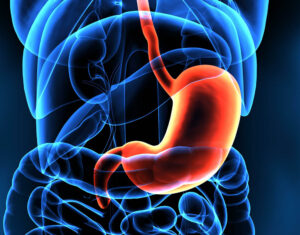 What is stomach cancer?
What is stomach cancer?
Stomach cancer, also known as gastric cancer, originates within the stomach, a hollow organ situated in the upper abdomen responsible for breaking down food.
This form of cancer may develop in any part of the stomach, but it usually starts in the inner lining, eventually spreading deeper into the stomach wall and potentially reaching other parts of the body, including the liver, abdominal wall, and lymph nodes
FAQs
Stomach cancer does not always present noticeable symptoms in its early stages and can progress without causing obvious symptoms until it reaches advanced stages.
However, when symptoms do present, they may include:
- Unintentional weight loss
- Abdominal pain or discomfort
- Heartburn or acid reflux
- Indigestion
- Nausea and vomiting
- Loss of appetite
- Bloating
- Fatigue
- Black or bloody stools
- Iron deficiency anemia or occult blood loss
- Difficulty swallowing
- Lumps or tenderness in the abdomen
The exact cause of stomach cancer is not fully understood, but there are several factors that can increase the risk, including:
- Helicobacter pylori (H. pylori) infection: H. pylori is a bacterium that can cause ulcers in the stomach lining. Long-term H. pylori infections can increase risk and account for more than 60 percent of stomach cancer cases.
- Family history: People with a family history of stomach cancer are at increased risk.
- Age: Stomach cancer is more common in older adults.
- Gender: Men are more likely to develop stomach cancer than women.
- Diet: A diet high in fried foods, processed meats, red meats, and salted foods may increase the risk of stomach cancer.
- Smoking: Smoking is a major risk factor for stomach cancer. About 18 percent of gastric cancer cases and 21 percent of gastric cancer deaths may be attributed to smoking.
- Medical history: Certain medical conditions, such as pernicious anemia and disease, can increase the risk of stomach cancer.
Stomach cancer is often diagnosed using a combination of tests, including:
- Physical exam: During a physical exam, the doctor will feel your abdomen for any lumps or tenderness.
- Imaging tests: Imaging tests, such as an upper GI series or endoscopy, can be used to look for abnormalities in the stomach.
- Biopsy: A gastric biopsy typically obtained during upper endoscopy (EGD) is the acquisition of a small tissue sample from the stomach to be examined under a microscope to look for cancer cells. This is typically required for diagnosis.
Typically, under sedation, an endoscope, or a long camera, is passed into the patient’s esophagus to allow evaluation of the esophagus, stomach, and top of the small intestine. At that time, all suspicious appearing gastric lesions or ulcers should be biopsied in multiple locations to increase diagnostic sensitivity.
After a diagnosis of stomach cancer is made, cross-sectional imaging such as CT scans of the chest, abdomen, and pelvis are done to evaluate for spread of disease.
Endoscopic ultrasound (EUS) is a complimentary test in patients without distant disease to evaluate the depth of the primary tumor and search for regional lymph nodes. If any areas outside of the superficial stomach lining are suspicious for disease involvement outside of the lining, EUS provides an opportunity for a deep needle biopsy.
EUS is performed in a similar manner to an EGD, but the endoscope has an ultrasound on its tip to see deeper layers of the digestive tract as well as organs on the outside of the stomach and small intestine.
Treatment for stomach cancer varies based on the stage of cancer, the patient’s overall health, and their treatment preferences. The best treatment is decided by a multidisciplinary team and tailored to each individual patient.
Surgery is the most common approach when a cancer is confined to one region, with the type of surgery chosen based on the tumor’s location and size.
Other treatments that may be used for stomach cancer include:
- Chemotherapy: Uses drugs to kill cancer cells. This can be employed before or after surgery. If the cancer is not able to be completely removed through surgery, this is the primary therapy with or without radiation.
- Radiation therapy: Uses high-energy rays to kill cancer cells.
- Targeted therapy: Uses drugs that target specific molecules involved in the growth and survival of cancer cells.
There is no sure way to prevent stomach cancer, but there are some things you can do to reduce your risk, including:
- Eat a healthy diet: Diets high in fruits, vegetables, and fibers can protect against stomach cancer. Avoid processed meats, red meats, and salted foods.
- Quit smoking: S Studies suggest a diminishing risk 10 years after smoking cessation.
- Get tested for : If you have H. pylori infection, your doctor can prescribe antibiotics to treat it.
- Talk to your doctor about your risk: If you have a family history of stomach cancer or other risk factors, talk to your doctor about reducing your risk and if additional testing is needed.